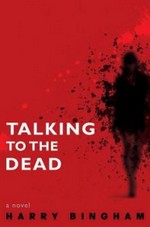 Talking to the Dead
Talking to the Dead
by Harry Bingham
Series: Fiona Griffiths, #1
Hardcover, 337 pg.
Delacorte Press, 2012
Read: February 16 – 17, 2016

One thing I need to do a better job of is remembering how I found out about a book/series/author that I need to try, this novel is a great example of why. I remember putting it on my TBR, and that there was something about it that made me move it ahead of the others — but I can’t tell you when or why I did so. Sometimes, like with this book, that drives me crazy. I just had to trust that I knew what I was doing when I picked it up. Thankfully, it didn’t take long to convince me that Fi Griffiths had something special going on — mostly it was the voice, the attitude, her humor as seen when she’s going through stacks and stacks of financial documents to make a case air-tight (before the inevitable guilty plea for ripping off a private school):
My desk is covered with paper. I loathe all banks and credit card companies. I hate every digit between 0 and 9. I despise every dopily run Catholic boys’ school in South Wales. If Brian Penry were in front of me now, I would try to force-feed him my calculator, which is as large and chewable as Bakelite phone.
It didn’t take too long before the merits of the case drew me in (not the drudgery of the case above, but the one that drove the novel’s action), and would have even without Fi’s narration. But it was a lock with her as a character. The grim nature of the killings grip the reader, the way they do Griffiths’ colleagues and superiors. What really impressed me was that it is one of the sickest, grossest descriptions of a corpse this side of a Bones episode — and Bingham doesn’t dwell on it — oh, he could’ve, and most authors would have. It’s there stark enough to give the reader the willies, in a just-the-facts-fashion, but Bingham doesn’t exploit the nature of the killing or the state of the body.
To put it charitably, Fi is quirky. To be more accurate, she’s suffering from a serious mental condition — she’s (mostly) got it under control, however. Social skills aren’t really in her wheelhouse — at least not automatically — which presents an additional challenge for her work. Early on, I kept picturing Diane Kruger’s performance from The Bridge, it diminished eventually, but I think Fi will always be Kruger-esque to me. We do eventually get actual information about her condition — which is nice, but we don’t need it to understand her enough to empathize with her. There’s an Author’s Note at the end with more details about the actual condition — don’t read it until the end. Get to know her absent the condition first.
Bingham creates a good bench of supporting characters — a potential boyfriend, a couple of supervisors (who have differing levels of concern for her), a former therapist, an old friend (former trainer/sensei-type), parents, sisters, and a few other detectives. One or more of these can be summoned from the bench with ease in the future, but we don’t get to spend a lot of time with any of them here — just enough to establish them. We spend some good time with her potential boyfriend, old friend/trainer/sensei and dad — I like them all and want to see more of them. But this is really Fi’s book and the narrative weight falls on her troubled, yet capable shoulders.
We hardly get an idea for what kind of men the bad guys are here — it’s just shadowy criminals, up to shadowy criminal things. I like the idea that we only get things through law enforcement eyes, not through the killer’s — that happens far too often for my taste. Like Fi says, I know this way we don’t get the full story, but I prefer not being in the mind of the sickos at work here. We, and the police, get most of the story in the end, and that’s good enough for me.
The book closes with a couple of the most heartfelt, moving scenes that I can think of in Detective Fiction (give me time, and I could probably make a decent list of competitors, still pretty sure this would be near the top — sure, that scene in Gone, Baby, Gone has this beat, but not many others would). I had a hard time believing that it would work as effectively given the fact this is a first novel for the character — but Bingham has laid a lot of ground work to get us ready for these moments, and it paid off well.
Talking to Strangers grabbed me in just the right way. I want to devote the next few days to just reading the rest if this series (I won’t, I know I need to pace myself, but… Oh, I really want to just binge). Fi is an early leader for favorite character of the year (a thing I just decided to do).
—–


